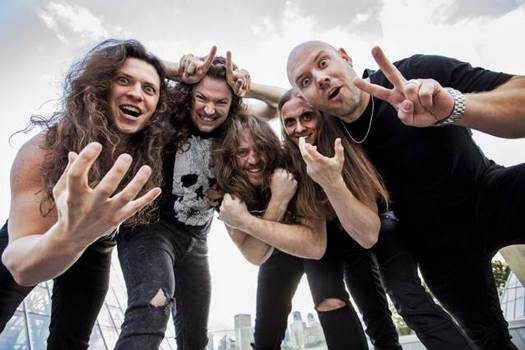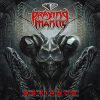Striker – Head First to Glory
Sunday, 4th November 2018
Vibrant times indeed for the Striker clan. Totally embracing the DIY aspect on all fronts (especially without a record label for the past three albums), these Canadians prove that adapting to a changing music industry landscape can pay dividends through smart application of knowledge and good old-fashioned hard work. Like clockwork annually, fervent metalheads can expect another album from this quintet- and their sixth album Play to Win may be their finest platter to date.
Combing over these tracks, you’ll hear bigger harmonies, exciting lead breaks, catchy as all hell riffs, and massive choruses with multi-part vocal harmonies. You’ll be hard pressed on initial passes not to be singing lines or humming the key musical passages within “Head First”, the AOR-ish “The Front”, or exotic “The Summoner”. Everyone who loves melodic metal, traditional metal, power metal, speed/thrash – there’s something in there for most when it comes to the Striker philosophy and output.
Ringing up guitarist Tim Brown, we get an update on how their most recent tour with Unleash the Archers and Helion Prime went, the scoop on their meticulous process to perfect the songs for the new album, and honest talk about many aspects of the music business and industry that the band takes into account to survive and thrive.
Dead Rhetoric: How did you feel the latest North American tour run with Unleash the Archers and Helion Prime went for Striker? Did you see a tremendous uptick in terms of solidifying your status in the scene because of the previous roadwork with Dark Tranquillity/Warbringer?
Tim Brown: Yeah, that tour was awesome. We didn’t know what to expect, we thought that maybe it would be similar attendance numbers as the Dark Tranquillity tour. I think we blew way past that – we had ten sold out shows in a row, over half the shows were sold out. Selling out venues like Reggie’s in Chicago, the Starlight Room here in Edmonton- those were hard sold out shows through pre-sales. The numbers that we put up were crazy, we ended up doing way better than we thought we would be able to do. I would tour with those guys again in a heartbeat- and we are looking forward to the next tour going to Europe with Skull Fist in about a week.
Dead Rhetoric: Is it ironic that you are doing these tours with Canadian bands at this point in your career- bands that you are familiar with but haven’t had the chance to do these longer tour runs?
Brown: Yeah, it’s funny. We’ve played shows with Unleash the Archers and Skull Fist, and all these other Canadian bands in the past, but never full tours. It’s really fun because we are good friends with all of these people. The metal scene in North America, and especially in Canada, isn’t a very big place. If there are bands that are actually touring internationally, you will run into each other quite a bit. I was just in Toronto where Skull Fist lives for two months doing some school work, and I was hanging out with those guys every weekend basically. It’s a small world out there, and it’s a lot of fun to be touring with fellow Canadians. In the past we’ve gone to Europe something like fifteen times, and we’ve always ended up touring with either Germans or Swedes (laughs). Which is awesome, and Sweden is actually similar to Canada in a lot of ways – but it’s fun to be on tour with Canadians because you can talk about Tim Hortons and the NHL.
Dead Rhetoric: The latest album Play to Win contains another strong set of material, with extra emphasis on the four (or more) part vocal harmonies that have become a Striker trademark. Where did you see the development of this set of material in comparison to previous albums, and were there any surprises, obstacles, or challenges to get through this go around?
Brown: This album was a treat to write, record, and work on. In the past it’s been maybe a little bit, less experienced in the past. Obviously this is our sixth album, self-produced, self-recorded, did all the engineering ourselves on the last three. This album we’ve certainly learned a lot from the last albums. We came in and knew the best ways to do everything, went in and did it. It was a nice change. Everything flew into place nicely. At least for me it was a great environment to create music. We are happy with how it turned out.
With this album we wanted to take it to the next level, and we really took our time going over the small things. Making sure the delays work, making sure the reverb was the right kind of reverb in all the places. Making small subtle tweaks, adding the right vocal thing here, adding a second harmony. Finding better ways to make each song as musical and as interesting as possible.
Dead Rhetoric: Two of my favorites are “Standing Alone” the ballad and “The Summoner” which has a bit of an exotic feel. What are some of your standouts?
Brown: “The Summoner” is definitely one of my favorites, I dig that song. It’s super heavy, and there’s a monster guitar solo in it. I really like “Head First”, that’s also one of my favorites. It’s interesting on this album in particular, all the songs for us were so highly ranked. What we do when we record- we rank all the different ideas that we have, whether it’s a full song or maybe just a riff. We give them a ranking to identify which songs to work going forward. We had this big chunk of really high scoring stuff. We do that same process again after we’ve selected the songs, being able to work on them for a while. We realized that all of these songs were really great. Often times there are one or two songs where you are like, ‘hmm- I wish I could have worked on that a little more’. Or after you record it you realize it didn’t come out quite as how I intended it to work. We wanted to make sure that everything was perfect this time and we are really happy with all of the songs.
Dead Rhetoric: I’m curious to know, with four guitarists in the band working on songwriting, how compositions flow from inception to completion? Are you going into things with thorough demos, or is there equal give and take and input from other members as your work on these songs?
Brown: The way we do most of our writing like I mentioned is everybody comes together with whatever ideas they may have. Whether it’s a full-fledged demo with lyrics and guitar solos or maybe it’s just a riff. We sort them out, score each one, and then whatever is in the top tier we focus on these ten to fifteen songs. After it goes through that process, we look again and see what are the ten best songs to go on the album. For the most part, most of the writing is done by Dan (Cleary) and myself. We write on our computers by ourselves, and after we get the rough demos done, then in the recording process we all chime in to shape the songs. Maybe this chorus is too long or too short, writing different guitar solos or little lead lines.
There’s definitely a lot of ways for everybody to contribute, but the main thing is we do our best to be egoless and to always focus on making the best song possible. There’s a lot of times when people are writing music, and they spend hundreds of hours on a song that they really want to be a part of the album. Or days spent on this one section. Well, what if it doesn’t sound good? Just because you worked on it, doesn’t mean it always gets to be on an album. People tend to get worked up, and they need to learn to let go – I admit that I spent two days working on some bridge and it doesn’t sound that great. Get rid of it- there are a lot of those moments where you have to be at peace with yourself and understand that not every idea is going to be a great idea.
Dead Rhetoric: Right. At this point, do you think the band members can be objective and leave the ego out of it, for the best benefit of the songs as a whole?
Brown: For the most part. That’s one of the failings of being human, to have an ego and sometimes it can work against you. We are able to avoid that, the song, the album – they last forever. You hope that people would continue to listen to them for many years. Looking back, this is our sixth album, and looking back to even our first album or EP – you wish you knew then what we know now. We could have had the production as awesome as it is on our first album. What if all of our albums were so well produced? We could have learned those tricks, and a lot of that is just the letting go of that ego, learning how to do things better.
Dead Rhetoric: As a band, do you discuss and strategize for short term goals and long-term plans? What are the most important aspects that you take into consideration currently when it comes to final decisions for the best interest of Striker?
Brown: The important thing, especially if you want to make a career out of your music, you have to understand the music business. Once you start treating it like a business, and not just a group of friends hanging out, then you’ll see your ship start to sail off into the waters of professionalism, so to speak. There’s a lot of…obviously, it is a bunch of guys hanging out together. We are all pretty great friends, we are best men at each other’s weddings. You have to treat it like a business, and that’s the most important part if you want to make a career out of it. You need to look down at what needs to happen. You need to have things like your bottom line in mind, you can’t be like ‘I want to go on tour, let’s spend all this money on one tour’ when maybe that tour is a bad idea to go on. Or be signed to some label, and you just signed your life away, that could be the worst idea you’ve ever done.
We get offers all the time by labels. Why would I sign to a label? That’s a terrible idea. You have to be out there and watching yourself.
Dead Rhetoric: When looking at the overall evolution and career arc you’ve taken as musicians, is there anything that you believe in retrospect you would change or modify if you could – or do you believe the setbacks, obstacles, and failures maybe aided you for the steady, upward climb you’ve been making?
Brown: For me, I always think that any failure or mistake is a learning opportunity. If you are not out there making mistakes, or pushing yourself to the limit, then you are not trying hard enough. If you are always succeeding, then you are not learning anything. You are not trying hard enough. Every setback is a learning opportunity. We’ve certainly made a lot of mistakes, and screwed all sorts of things up – but in the end we are better for it, so I wouldn’t change anything.
Dead Rhetoric: When it comes to the overall health and state of the metal scene, do you believe there are specific areas of concern that maybe the average consumer doesn’t take into consideration that bands, promoters, management, and venues have to in terms of making ends meet from a business/fiscal standpoint?
Brown: Yes. A lot of people are like, ‘oh man – can I get on your guest list?’ And I would love to put everybody in the world on the guest list. The fact of the matter is, industry standard generally gives one guest list spot per person. A lot of these venues we are playing, that would be five guest list spots. Often times we have different industry people, interviews or a photographer coming to the show, and those eat up our spots. Sometimes it ruffles their feathers, as to why so and so got a spot and not themselves. We only have five spots, and maybe they are helping us out some other way. It’s stuff like that – or sometimes people ask, ‘hey – can I just get a CD for free?’ Especially for bands that are signed to labels these days, they have to buy their CD’s from their record label, and it’s not cheap. You might be spending 7 Euros per CD ($8) to get their CD, and a lot of times you’ll see these bands on tour selling it for 15 or 20 dollars – and a fan is like, ‘oh- I only have $10’. The band wants you to have their music, but if they are selling it for $10, they are losing money on it. Which is unfortunate, and it’s a really tough environment out there.
It’s very rare that a band is making money on tour. Every tour is just a large money pit. You go out there and see a band on tour, they are losing money to come out and see you – they need your support. Having people come out to shows, that’s a huge thing and they need you to keep coming out to shows.
Dead Rhetoric: It seems like all parts of Canada these days have been blossoming on the international scene for metal – bands like yourselves, Unleash the Archers, and Skull Fist consistently developing a strong following in all parts of the globe. Do you believe the internet has become the great equalizer compared to a scene in generations previous where securing the right record label with proper distribution and having the right manager made the difference?
Brown: It’s still a little bit of both. You still definitely need the right manager and the right booking agent and stuff. The internet though is definitely a great equalizer. I can record a song and release it on Spotify, iTunes, Amazon for tomorrow. There’s never been a better time to release music and do it all yourself. It’s never been easier. There is a lot of music that is coming out that’s helped along by that. It’s still a tough grind. A lot of people think that we are so successful. People think that there is a lot of this success going around. It’s like, overnight sensation – only took around ten years. (laughs). People have been finding out about us now for the first time, it took us ten years to get them. It’s quite a grind to find your fans or find the people that would like your music. It takes a long time, definitely.
Dead Rhetoric: Is it easier to set up touring with like-minded genres in Europe versus North America, where diversity is important?
Brown: I think Europe is just the better place to tour, no matter what. It doesn’t matter what kind of genre that you are in. Europe is the superior place to play, that’s where we started touring. The venues are better, the staff is better- not to knock on anyone in North America by any means. There’s just so much more… the society is more invested in the cultural industries in Europe. It’s more woven deeper in the fabric of society. A lot of these venues in Europe are government funded. The promoter doesn’t have to pull his hair out trying to promote some metal show – he can book the show and be okay with there being 100-200 people for this obscure band. They can feed the bands properly, maybe the venue has a shower, they have accommodations and beds for the bands. That doesn’t exist in North America. It’s certainly a different environment.
Dead Rhetoric: Do you believe sponsorships help the cause – as I see hundreds of different businesses and companies that help sponsor many of the metal festivals that go on over in Europe as well?
Brown: I think a lot of the sponsorships are more like advertising stuff. We’ve played festivals that are put on by certain guitar amp companies. Backstage you are talking to the stage manager and all the gear and backline is rented from some gear manufacturer that the festival is paying for, but the big banners are sponsorships that are also helping to pay for some of the costs. That’s important revenue for their festivals, and without it they wouldn’t be able to bring in the big headliners so it’s important.
The music industry is constantly changing, and I think it’s important for everyone involved to keep evolving and finding new ways to be successful.
Dead Rhetoric: Do you run into issues in Europe with merchandising where they take percentages of your merch sales that can often happen here in North America?
Brown: I think that’s mostly… well, it happens everywhere, but that’s sort of a dirty secret of the music industry in general. People get pissy about seeing some big-name band in an arena and t-shirts were $50-$60, and they are just gouging us. It’s not the band, it’s the venue. The venue is taking 50%-60% or more- and often times they aren’t doing anything. At some of the venues we played on our North American tour, they took merch cuts and they aren’t doing anything. They don’t provide you with staff, they don’t provide you with lighting, or services. They send a bouncer at the end of the night to take their cut. Okay- you are taking money from us, and you literally did nothing. I understand the promoters are trying to find a different way to make some money, but the fact of the matter is, you are a promoter and you can’t make ends meet? If you aren’t doing the shows the right way, maybe you need to get into a new line of business.
They are taking a cut of the merch sales- well, why don’t I get a cut of the alcohol sales? If I’m a band and playing your venue, I’m the reason why people are here. Why can’t I get an alcohol cut? It’s the exact same logic they are using to get a cut of your merch sales.
Dead Rhetoric: You mentioned in another recent interview if you could bring back one deceased musician, it would be Cliff Burton of Metallica. Since he was a bassist, who else would you pull from that’s deceased to fill out the roles of your ultimate, supreme metal band?
Brown: (laughs). Oh man. I would get Dio to sing. Then you’d have to get, the Pantera brothers – Dimebag Darrell and Vinnie Paul. And I’d think you would have a pretty rocking band with that lineup.
Dead Rhetoric: You already have plans to go to Europe with Skull Fist to start the tour cycle for this new record. What’s on the game plan for the next twelve months? Will there be official video releases rolled out for specific songs on this record, and are you hopeful to hit new territories?
Brown: We have tons of stuff going on. We have a new music video coming out this coming week. Obviously the album will be out- we have our tour with Skull Fist in November. We have some album release shows in December at home. We are already planning our next North American and European tours – and we are trying to go to new places like South America, Japan, and Australia, Asia. I think 2019 is going to be a really great year for us.




























